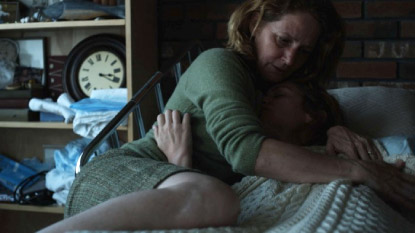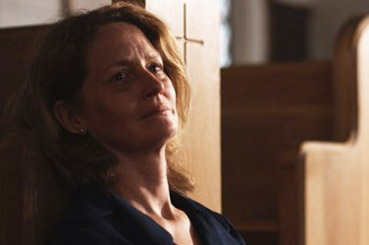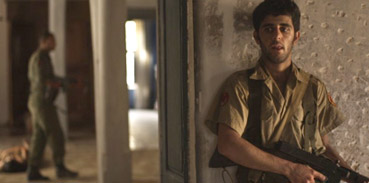|
Maritime woes weigh heavy in actor-turned-filmmaker Jordan Bayne's The Sea Is All I Know. Even before we meet the estranged couple tasked with following through on their dying daughter's unfathomable request, the series of snapshot glimpses introducing the Boston fishing town in which they reside shiver with windswept portent, suggesting all is not well beneath the picture postcard veneer. Though the film ladles on the anguish, it isn't stodgily hammered home in every aspect. The characters are deeply depressed and drably dressed to match, but the palette of the world around them remains vivid and alive, a contrast that pointedly isolates parents Sara and Sonny (Melissa Leo and Peter Gerety) in their suffering as life moves on without them; left as they are to carefully consider a decision which no parent should ever have to face.
Sara has just returned from hospital with bed-bound daughter Angelina (Kelly Hutchinson), perpetually writhing in agony and unable eat or hold her breakfast. Against the advice of doctors sternly intoning that Angelina should have remained in hospital, Sara refuses to see past a mother-knows-best iron will, from which she forcibly fashions a return to normalcy in her daughter's darkest hour. For Sara, moving beyond the sickness that has irreversibly shattered any semblance of unity in a home already buckling under the strain of a deepening marital rift means retreating into the past. Reuniting Angelina with the teddy bear they gave her leaving the hospital immediately after she was born is a perceptive gesture, revealing a woman who feels cheated by her lot in life and needing to believe that somehow, she might be allowed another roll of the dice. Though the film is characteristically arduous and spare, it's careful, insightful details such as these that really enunciate the quality of the material, lending the characters a lived-in, textured life extending far beyond the slim running time.

Meanwhile, father Sonny is so spooked that he is reluctant to even leave his car and cross the threshold—their broken home now seemingly has no chance, as though his wife has brought death itself home from the hospital. Having previously cheated on his wife and run out on his daughter numerous times, Sara's deep wells of pain and resentment continually spill over, bruisingly communicated in terrifically tough-nailed dialogue:
"Don't you think about stepping a yellow foot inside my house unless you intend on staying. You got the balls for that, Sonny? Or did your last mistress take those too?"
The script is peppered with remarkably flavorsome language scrubbed clean of verbal theatrics, three-dollar words and cinematic eccentricity – an increasingly rare thing in an indie cinema besieged by ‘quirk.' Sara and Sonny have been dancing like this now for too long to know any better—when Sonny is eventually bold enough to step foot inside his daughter's room and attempt to momentarily soothe her, he sings a childhood lyric about escaping to the sea, a brief respite that's as close as she and her parents will ever get to any kind of escape from their pain, even as the sea is viewed so tantalizingly close through floor-to-ceiling windows behind them. A God-fearing man, Sonny understands all too well that he might now be suffering for his past transgressions, but can't help railing against an unkind God whose son suffered hours instead of months. He may have been a wayward father, but Sonny isn't prepared to so easily send his child to the gallows as God was, in spite of his daughter's wishes. Sonny's religious pain is shown to be as great as his daughter's, editor Philipp Wolter purposely cross-cutting between the fish thrashing in Sonny's net (with whom he readily identifies) and Angelina convulsing on her bed.
The later suggestion by Sara, that their daughter's birth was as much against natural law as her impending death, serves as the film's pivotal moment of true spiritual crisis—Sara acknowledges that Angelina is the only thing the couple has that still binds them, that without her they're just another husband and wife in a loveless marriage. Implicit in this statement is the ambiguous question as to why they had this child together in the first place, perhaps for no other reason than to selfishly keep their marriage intact. Sara shudders at the memory of her breech birth, Angelina clinging to her ribs as if she didn't want to have anything to do with this world—with it comes the realization that parental dramas must be put aside so that they might selflessly give their daughter in death, what they could not grant her in life. In despairing epiphany, husband, wife and audience are confronted with the awful truth of what lies in store for the rest of their days if they choose to walk down this path. Not only the daily pain of being made to forget their daughter and what they did, but also the guilt of one day forgetting altogether. If this were a ninety minute feature with an hour still to go, then what is witnessed up to this point is a brilliant first act laying out some bleakly mesmerizing existential questions. I would love to see that next hour in which Sara and Sonny live with the choice upon which the film hinges and confront the existential questions posed.

Although largely shot in down to the bone close-ups, the sense of confrontation never results from the close quarters camerawork, which is curiously observatory, remarking more on the delicacy of the actors' haggard features than the fury of their verbiage. Deeply wounded reaction shots belie the hateful words spat back and forth, and as the film slowly reveals itself to be as much about love as it is death, so to does it show itself to be rich in primal pathos. Such swelling emotional power is due in no small part to Melissa Leo who, despite her already astounding list of credentials, is something of a revelation here, carrying the film with customary hard-bitten ease. Reaching down deep, Leo finds the heart in what could so easily have become a parade of torments. It's a part very much in her repertoire, but still feels much less removed than the me-against-the-world martyrs of Frozen River and 21 Grams. In those roles, I often felt like I was being ‘acted at' given the way she was able to become scarily volcanic so quickly, tirelessly firing on all cylinders throughout. Often, I find Leo (through no fault of her own) has such presence that she tends to not so much steal scenes as utterly dominate them (watch any time she's on screen in The Fighter as a case in point). Here, she was able to create just enough space without needing to hold herself in check, genuinely sharing her scenes with co-star Peter Gerety, making for an utterly absorbing watch. ‘That guy' actor Gerety, sensing his moment to stand toe-to-toe with a titan and share the spotlight, relishes the chance to dig into a just-as-substantial role, quietly giving it everything in scenes that see him stoically absorbing aggression like a pugilist sucking up punches. In the more emotionally draining scene the two actors' different styles of approach really serve to demonstrate the disconnect between their characters and somewhere in that gap, the harsh world of The Sea Is All I Know is beset by surprising moments of grace and human kindness.
Facebook: http://www.facebook.com/jordanbayne
Twitter: http://twitter.com/#!/jordanbayne
Website: http://www.jordanbayne.com/
The only moment of grace and human kindness during Anthony Maras' The Palace is of the heart-in-your throat variety. Set during the 1974 conflict in Cyprus, a nineteen-year-old Turkish conscript finds a Greek mother and newborn baby in hiding during a sweep of an abandoned palace. Looking down the barrel of a gun, the young man with aspirations of studying as an actor at RADA in London is faced with the awful recognition of what he's participating in. Up till now he's kept his head down, blindly following the instruction of his superiors, but witnessing the cruel indignity of a desperate mother—on the verge of smothering her child so that her cries won't give away their position—is an incident that snaps him out of mechanized stupor. In the next room his sergeant gleefully encourages torture, barking orders which harbor no consideration for the value of human life, only that such brutality will help turn the boys under his charge into men. Momentarily paralyzed by the sight of this newborn with no comprehension of the erupting tensions between the two communities, the soldier is forced to make a choice, and in so doing confront the full measure of the atrocities committed, his part in them and the blood that he'll never be able to wash off his hands, even as far away as the UK. Time seems to slip into suspended animation, but as he finally shifts down a gear after an extended opening shootout featuring one of the year's most bone-rattling 5.1 Dolby mixes, director Maras' choke-hold on the audience only tightens, suspense building not to a point of release, but asphyxiating hysteria. Watching the mother (Daphnne Alexander) sucking back tormented sobs as the soldier's finger brushes the trigger is excruciating.

The street level violence that plays out amongst bombed-out buildings is shell-shockingly real and The Palace sets out to shred nerves from its opening moments. Impossibly visceral and immediate, mortar fire plunges us right into the action and sends a roof collapsing down around a family, who have no choice but to flee from their home. The rhythmic pelting of machine gun fire taking chunks out of the buildings and street signs is a constant reminder of the pursuing soldiers as they race across the city looking for shelter. Everything in the sound design is aggressive; the trembling piano notes of Argyro Christodoulides' score reverberating like the ping of bullets. The chase sequence is breathlessly executed and fluid, despite being hand-held. Cinematographer Nick Matthews works hard to put an onus on a sense of geography amidst the chaos, something the increasingly self-conscious quick-cut shakes of the Bourne franchise were sorely lacking in and have a lot to answer for, considering their influence on the choreography of modern action set pieces. Clearly, Paul Greengrass might stand to learn a thing or two from Anthony Maras.
Once you've settled in as best you can to The Palace's unremitting ballistic assault, the awe-inspiring scale of the production starts to emerge. Rumble-strewn streets are obscured either end by thick, plumes of smoke, rendered in wide shots as little more than contortions of smoldering ruin, hazardous at every turn and treacherously maze-like. Even without bullets whizzing directly overhead, simply navigating the terrain makes the family's journey one which is fraught with peril. Even more remarkable is how this Cypriot-Australian co-production has somehow turned dimes into dollars whilst shooting on locations along the United Nations Buffer Zone in Cyprus. With the majority of short films, we tend to think of projects that reflect their budget, small chamber pieces full of attention-grabbing angles and heavy on dialogue, whereas what we have here is sixteen minutes of non-stop action that rivals the highest Hollywood standards and on more than one occasion surpasses them with blitzkrieg duck n' cover staging.
Not making the grade for Oscar consideration but already generating a lot of buzz on the festival circuit in Australia, if Maras can get this seen by the right people, a transition into high-wire shoot ‘em up political thrillers surely beckons.
Facebook: http://www.facebook.com/thepalace1974
Website: http://www.thepalace1974.com/The_Palace/Home.html
|